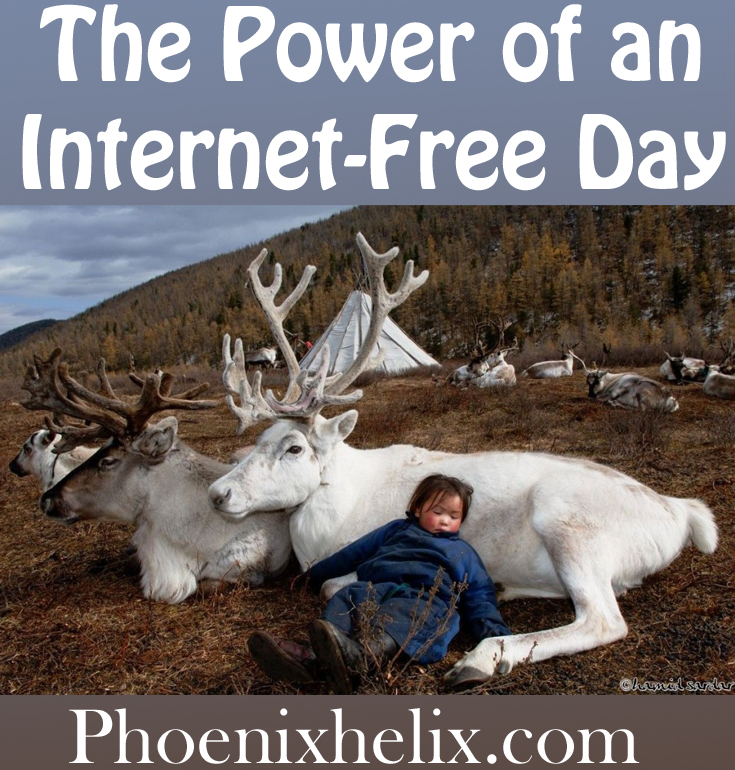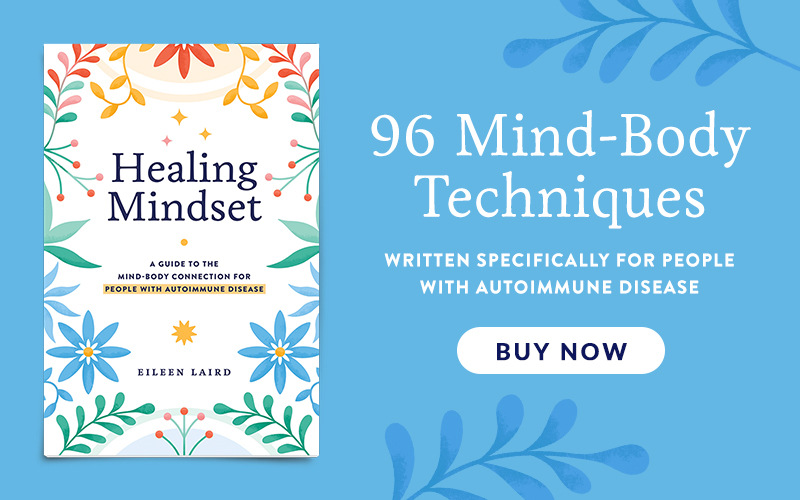
~ Henry David Thoreau
I have a confession
The internet makes me nervous. Not the way you might think. I don’t fear identity theft or stumbling onto an offensive website or being led astray with misinformation (although those are valid concerns). Rather, the more I use the internet, the more restless I become, the shorter my attention span, and the more challenging I find it to simply sit still. It took me a long time to make the connection. I’m in my 40’s, and people say hormonal changes affect all of these things. I thought it was just a sign of age that I went from being someone who read a couple of full-length books every week, to someone who carried the same book around for a year. Then there’s that feeling in my stomach – the butterflies that I enjoyed when I was a teenager and saw a cute boy across the junior high school dance floor – but now they flutter all the time. I am always buzzing.
One day, I decided to take a weekend off from the internet altogether. In fact, I gave up TV too, so I got to experience a screen-free, distraction-free weekend. Let me tell you: it was AMAZING.
The days are so long! There is time to spare. I finished one book and started another. I got all my cooking done for the week, without feeling any pressure to do so. I spent time outside, soaking up nature, walking slowly, listening to the wind. I was creative – I wrote in my journal, I drew a mandala, I took artistic photos of my neighborhood.
I breathed more deeply. I took a nap. I spent time with people I love – quality time, eye contact time, conversational time, snuggling time. And the rejuvenation that came from that internet break was a revelation. I can’t recommend it strongly enough. Now, I take a day off from the internet every week. Sometimes I’ll do the whole weekend. And sometimes when we take a vacation, I purposely pick a place with no internet access, to experience a full week offline.
Now, obviously, I’m not anti-internet. My career is online. And without the internet, I wouldn’t have discovered the paleo autoimmune protocol or the rich community surrounding it. I’m not telling you to give up the internet forever, just see what it’s like to give it up for a day, and discover the gifts that day brings.
Tips
- Decide whether you’d like to go internet-free or completely screen-free (no tv, internet, cellphone, video games, etc.) I recommend screen-free, but if you need to ease yourself in, going internet-free is powerful, too.
- Commit to a length of time. I recommend a minimum of 24 hours to really feel the benefit.
- Keep a notebook handy. Your mind will generate things you need to research on the internet, or people you need to text or email, things you must do now before you forget. Make a list. You can do it tomorrow, and writing it down helps let the temptation go. After a while, you mind will let you be.
- If you have a smartphone, consider hiding it. Put it in a drawer, or even out in the garage. Out of sight, out of mind.
Benefits
Regain your attention span: The internet trains us to have a short attention span, through the shortness of the articles, the vastness of the information available, the way we can click from link to link to link in an article. Our brain gets used to doing that, and starts to expect the same in daily life, even when we’re offline. We pick up a book and put it down after a page or a paragraph. We start a conversation, and our mind wanders to five other things before our friend finishes a sentence. We start cooking a meal, and check our texts and facebook account while the butter’s melting, or the water’s boiling. Before you know it, we live a life of distraction, always feeling pressed for time, where focus has become a thing of the past. The good news is that this isn’t a permanent change to our brain. We can reverse this feeling just by taking a break. Your attention, your focus, your calm center are all still inside you. You just need some time offline, to feel it again.
Improve your health through the power of sleep: I mentioned that I took a nap on my internet & tv-free weekend. I also went to bed earlier and slept a little later. When I’m plugged into the internet or tv, time flies, and before I know it it’s past midnight. I also find my “to do” list grows, and feeling a lack of time and focus, I set my alarm earlier and earlier to manage the load. A recent study showed that after a week of sleep deprivation, genes responsible for the repair of damaged tissue in the body get turned off and stop doing their job. That’s a scary thought. Research also shows that lack of sleep has a direct effect on immune function and also increases inflammation in your body, two things especially concerning to anyone with an autoimmune disorder.
Enjoy the health boost of being outdoors: One of the problems of modern life is that it’s possible to spend our entire day and night indoors, with no exposure to nature at all. This isn’t how the human body was designed. Have you ever been under a huge amount of stress and then stepped outside for a minute, and almost immediately felt your heart rate slow down, your breath deepen, and your mind start to calm? If you answered yes, you’re not alone. Here’s a quote from Science Daily:
“Elderly adults tend to live longer if their homes are near a park or other green space, regardless of their social or economic status. College students do better on cognitive tests when their dorm windows view natural settings. Children with ADHD have fewer symptoms after outdoor activities in lush environments. Residents of public housing complexes report better family interactions when they live near trees.”
There’s a huge body of research into nature’s benefits. So take advantage of being unplugged to get outside and go somewhere beautiful. Depending on your options, that can be pulling out a lawn chair and feeling warmed by the sun, sitting next to a city fountain and feeding the birds, hiking a nearby trail, or taking a day trip to the beach. Remember that, as human beings, we weren’t made to spend 100% of our lives indoors.
Dust off your old hobbies & find some new ones: How did you spend your free time before the onset of technology? Do you even remember? Pull out the novel that’s been gathering dust on your nightstand. Get out your journal and write an entry by hand. Find your knitting needles and finish that sweater. Get out your guitar, sit down at the piano, see if you remember how to play your high school flute. Write a poem. Doodle. Grab some magazines and cut out words and pictures to create a dream board; you don’t need Pinterest to do this, and the tactile experience is a lot more fun. Do some gardening: it’s the adult version of playing in the dirt. Learn to juggle. Call some friends and play a pick-up game of your favorite sport. Do you like building things? You can start a project as small as a model airplane or as big as a cabin in the woods. There are so many ways to have fun. As adults, we can often forget how.
Rediscover family time: If you have kids, you’re lucky, because they know how to have fun. Have them unplug with you. They might object when you first mention turning off the devices for the day. At first it might even feel awkward, as you all wonder what to do. Here are some ideas to get started: Play an old-fashioned board game or a game of cards. Pull out the crayons and markers and have fun drawing together. Start a nerf gun war. When it comes time to make a meal, cook together. Have the young children help fill the measuring cups and teach the older children some knife skills. Make some grain-free cookies. Eat your meals at the table, and talk to each other. Has it been a while since your children have given more than one-word answers? Try this book to get the conversational ball rolling. Get outside and go to the park. Depending on the season, play frisbee, go fishing, have a snowball fight or rake some leaves together for everyone to jump in. Rediscover each other as a family. If you have teenagers and they think all of these ideas sound lame, how about re-creating some experiments they love on youtube? Have fun with the chemistry of diet coke and mentos, or build your own catapult for a home version of punkin chunkin.
Check something off your to-do list: You may not think you spend a lot of time watching tv or surfing the internet, but time flies when we’re in front of a screen. Hours can pass without realizing it, and even if that’s not the case for you, a few minutes here and there throughout the day adds up. So today, when you are free from technology, take advantage of the time and complete a project that’s been hounding you. Check something off the list and feel the satisfaction of doing so.
On the other hand, do nothing: When’s the last time you did that? With the pressures of work, family, home, school and maintaining our health, the days seem far too short to accomplish all we need to do. Today, take a few minutes (or a few hours) to consciously do nothing. Gaze out the window. Listen to your heartbeat. Give yourself permission to simply be.
Rediscover romance: Intimacy often takes a back seat to life’s daily “to do” list. In most longterm relationships, people are more likely to divvy up chores over the weekend, rather than sit on the couch gazing into each other’s eyes. So, on your unplugged day, make some time to sit on that couch. Really look at each other again. Talk and really listen to each other. Or be silent and remember how it feels to lean against someone and feel yourselves breathe in synchrony. In addition to feeling good, research shows that touch lowers cortisol levels (the stress hormone) and raises oxytocin levels (the trust and safety hormone). People say you can’t go back in time to the infatuation phase of first falling in love. Maybe not, but you can create a space to really feel the love you share. Sometimes, a libido you thought was dead just needs an opportunity to blossom.
De-stress: Technology enhances our lives in many ways, but with it comes obligations, pressure and added stress. Unplugging for a day is all about taking a break from that stress and remembering what it’s like to live the slow life. There are hundreds of studies connecting stress to disease. I’ll leave you with one which summarizes the past 40 years of research: chronic stress leads to immune system dysfunction, delayed wound healing, an increased susceptibility to illness and chronic bodywide inflammation. That’s a cycle worth stopping, and taking a technology-free day is one way to interrupt that cycle.
Do you unplug from the internet occasionally? What are the benefits and challenges for you?
You May Also Be Interested In
Photo Credit: I fell in the love with the photo at the top of this post. It’s by the talented photojournalist Hamid Sardar-Afkhami, who has spent years documenting the lives of one of the last nomadic mongolian tribes: the reindeer people.








Thank you for this…..It helps to know that others understand. You rock.
You’re welcome! Here’s to making offline time a regular part of our lives.
Great post and that photo … absolutely breathtaking!
I agree! I never tire of looking at that photo.
I love this! I have found that even just taking the night off from the internet is so powerful. I will have to try a whole weekend soon!
Thanks for sharing on Natural Living Monday!
Great points, I totally agree. I have to unplug sometimes and just take a book to a coffee shop. I don’t even connect to the internet on my phone, ever, so I don’t get sucked in. I might be behind tech-wise, but at least I’ve got my sanity 😉
Thanks so much for sharing this on Waste Not Want Not Wednesday, I’ve pinned it.
The fact that you don’t connect to the internet on your phone is awesome and very rare. One of the reasons I don’t have a smartphone is simply fear that it will take over my life! I don’t trust myself to be as disciplined as you.
LOVE this post!! I am guilty of being a screen addict. I never really thought about how it contributes to short, fleeting thoughts and lack of focus, but I definitely agree. I am going to try this!
Thank you for sharing on Natural Living Monday!
Let me know how it goes!
Wise words, and I wish you the best in making this a regular part of your life. My husband, the Norwegian Artist, and I have long taken Sunday as a day different from any other, and while our kids are on the computer or the phone, we’re not. I loosely tell myself, “If you normally do it throughout the week — barring eating or sleeping, etc. – give it a rest today. Given that I write and run an online art gallery, that means that most days, I’m online. Being off for that one day (and I try to grab Saturday, too), rejuvenates me for the week.
I love this: “If you normally do it throughout the week, give it a rest today.” I guess in many ways, we’re talking about reclaiming the sabbath – yet another tradition that’s gotten lost in the modern world, when we need it more than ever.
I so agree, I have lost some of me….you know I never really felt that I had an short attention span until here lately. It seems as though I have been all over the this, in my mind I am saying do I have ADD and did not realize it. But I have started getting out more and I changed my diet. I am way over 40 so maybe it is a part of menopause and I do lack sleep since I am a night nurse. New follower from blog hop.
Living F.A.B.ulously on Purpose
Sleep and menopause may play a role, but I’m willing to bet the internet is a big piece (from one blogger to another!) Thanks for visiting and commenting. I’ll look forward to browsing your blog as well; I love its name!
I so agree! I think that too much time in front of this screen makes me jumpy and unconnected to the world around me. Such a good reminder- thank you!
Kindred spirits.
You made me think I may need to do this! I noticed the attention span stuff. Good to hear it’s nothing like permanant damage, but a break from my computer every once in a while would be good. Sometimes it’s hard, though, because so much of what we do revolves around it. Hard, but possible. 🙂
Thanks for sharing, Eileen. 🙂
Yes, sometimes what’s hard is what we need the most!
I loved this article and I totally agree – it’s amazing how much you can achieve and re-discover when internet-less!
I actually like the internet going down because I CAN’T be tempted!
Great article!
You’re awesome! So many people feel trapped when their internet goes down, but you see the silver lining.
I loved this…thanks for writing and sharing it!
It’s amazing how it is so hard to have a screen-free day. After all, 25 years ago, almost all my days were screen-free!
This is a great reminder about the benefits of a technology pause. Thank you!
That’s so true! It’s amazing how life changes.
As a family I introduced “Screen free Wedsnesdays” a few months ago. Initially the children (2boys 11yrs and 9yrs) moaned and asked “what can we do?” But now they don’t even think about it! They come home from school and play together. We talk together, play board games together and we love it. The mood is lighter and better as we are not moaning at them to come off the screens! Homework gets done without arguing about it! I have to admit the hardest one to convince is my husband as he uses the telly to unwind after his long 14he days at work but even he agrees how much nicer it is. I recommend it to EVERYONE for at least a day a week and you’ll also see how much nicer your family is to one another (after the initial moaning! )
What a great testimonial! Thanks for sharing, Enza.